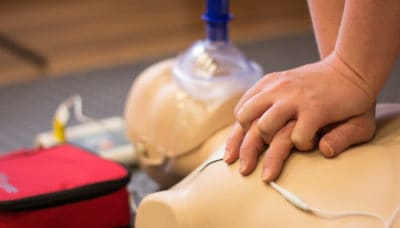Introduction
In our busy globe, emergencies can strike without warning. Whether it's a minor injury, a medical emergency situation, or a serious situation, recognizing how to offer first aid can make all the distinction. This is where a First Help course comes into play. Many individuals might wonder what they can obtain from such training, and this post aims to shed light on that.
By enrolling in a First Aid and mouth-to-mouth resuscitation course, you don't just find out about wrapping wounds or executing mouth-to-mouth resuscitation; you outfit on hltaid012 Child Care First Aid Course your own with vital skills that could save lives. So, just what will you learn in a thorough program? Allow's dive into the details.
First Aid Essentials: What You'll Learn in a Comprehensive Course
Understanding First Aid
What is First Aid?
First help describes the first assistance provided to somebody suffering from an injury or illness up until expert clinical aid gets here. It encompasses different techniques and skills varying from straightforward injury like lifesaving strategies like mouth-to-mouth resuscitation (Cardiopulmonary Resuscitation).
Importance of First Aid Training
Why Should You Take an Emergency Treatment Course?
Taking a First Help course is necessary for a number of factors:
- Confidence: Recognizing exactly how to respond in emergency situations can instill confidence. Life-Saving Skills: The ability to execute CPR or assist with choking can conserve lives. Career Development: Numerous professions require certification in very first aid. Community Obligation: Being trained ways you can help others effectively.
Overview of CPR
What is CPR?
CPR, or Cardiopulmonary Resuscitation, is an emergency treatment performed when someone's heart beat or breathing has stopped. It integrates chest compressions with rescue breaths to maintain blood circulation and oxygenation up until expert assistance arrives.

The Structure of a Comprehensive Emergency Treatment Course
What Does a First Aid Course Include?
An all-round First Help and CPR course typically covers the complying with topics:
Introduction to First Aid Legal and Ethical Considerations Scene Safety Basic Life Assistance (BLS) CPR Techniques Choking Relief Wound Care Management Burn Treatment Managing Shock Recognizing Clinical Emergencies Using an Automated External Defibrillator (AED)Legal Aspects of First Aid
Are There Legal Ramifications Involved in Offering First Aid?
Yes, supplying first aid does lug lawful duties referred to as "Good Samaritan regulations." These legislations shield individuals that assist others hltaid009 CPR Courses in emergencies, provided their actions are sensible and not reckless.
Scene Safety: The Very First Step
How Do You Ensure Scene Safety?
Ensuring scene security includes evaluating the environment before approaching the target:

- Look for prospective hazards (website traffic, fire). Make sure it's safe for both you and the victim.
Basic Life Support (BLS)
What Role Does BLS Play in Emergency Situation Situations?
Basic Life Assistance consists of the basics of maintaining life functions till further clinical help arrives. This area covers essential skills such as:

- Checking responsiveness Activating emergency solutions Performing high-grade chest compressions
Advanced mouth-to-mouth resuscitation Techniques
What Are Advanced Techniques Covered in Mouth-to-mouth Resuscitation Courses?
Advanced methods might consist of:
- Two-rescuer CPR Use of obstacle gadgets for rescue breaths Special factors to consider for infants and kids
Choking Alleviation Techniques
How Do You Help Somebody Who is Choking?
Choking relief entails 2 crucial methods:
The Heimlich maneuver for adults. Back strikes and upper body drives for infants.Wound Care Management
How Do You Properly Handle Wounds?
Effective wound administration entails:
- Cleaning the injury with saline or tidy water. Applying antibiotic ointment. Covering it with clean and sterile dressings.
Burn Treatment
What Work Techniques for Treating Burns?
Burn therapy differs by degree:
Cool the burn under running water. Cover it with non-stick dressings. Seek medical attention for severe cases.Managing Shock
How Is Shock Identified and Treated?
Recognizing shock includes seeking signs like light skin, rapid pulse, or confusion:
Lay the person down. Elevate their legs unless there are injuries stopping this. Keep them relax until help arrives.Recognizing Clinical Emergencies
What Kinds of Medical Emergencies Must You Know Of?
Common clinical emergency situations consist of:
- Heart strikes Stroke Severe allergies Recognizing these problems helps you act quickly.
Using an Automated External Defibrillator (AED)
How Do You Use an AED Correctly?
Using an AED involves turning it on, attaching pads according to illustrations on the device, and complying with voice motivates carefully.
Importance of Constant Learning
Why Is Continual Learning Important in First Aid Training?
Continuous understanding ensures you stay updated on finest methods and new procedures in emergency treatment care.
FAQs Concerning Emergency treatment Courses
What Is Consisted of in a Criterion First Aid Course?- A conventional program commonly covers basic life assistance, injury administration, choking alleviation methods, and legal considerations.
- Most courses vary from 6 hours to 16 hours depending on the deepness of web content covered.
- Yes, upon successful completion of many courses, participants get a first aid certificate, which is generally legitimate for two years.
- Yes! Many organizations use on the internet training courses that offer versatile discovering settings while still being effective.
- Absolutely! Hands-on technique is vital for grasping abilities like chest compressions and making use of AEDs effectively.
- Generally, there are no age limitations; nonetheless, participants need to be psychologically skilled to learn these life-saving skills effectively.
Conclusion
Enrolling in a thorough emergency treatment course gears up people with crucial understanding that can conserve lives during emergencies-- whether in your home, job, or out in public rooms! From recognizing fundamental life support procedures such as mouth-to-mouth resuscitation to learning how to manage wounds correctly or recognize indicators of shock-- these programs supply very useful training that anybody can benefit from!
As we navigate via our day-to-days live full of changability-- what much better way than preparing ourselves via expertise acquired from structured training sessions focused on saving lives?
In conclusion-- if you're pondering taking up any kind of type of first-aid training-- never wait! Equip on your own today with these effective tools since readiness genuinely makes all the difference when every 2nd counts!